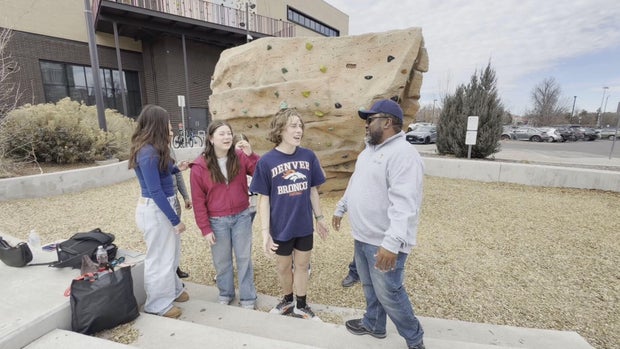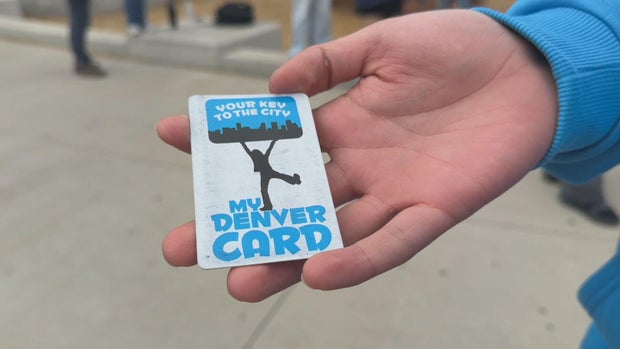Denver, CO
Office properties to see ‘a spreading of value’ this cycle, Denver assessor says

Denver Assessor Keith Erffmeyer speaks at BusinessDen’s “The Future of Office Event” on Sept. 10, 2024. (Matt Geiger/BusinessDen)
The Denver official tasked with valuing the city’s real estate said Tuesday that office building valuations will likely bifurcate this cycle, with top-tier properties holding steady while less-desirable properties see significant declines.
“I think we’ll see a spreading of value unlike I’ve ever seen in Denver, going all the way from downtown to the Tech Center — Cherry Creek seems to be immune to anything, so that might not happen here — but that’s kind of what we’re looking at, is really a two- if not three-tier market,” Assessor Keith Erffmeyer said.
Erffmeyer made the comment at BusinessDen’s “The Future of Office” event, where he and five real estate executives discussed the office sector’s status and outlook. The event was held at the Clayton Hotel & Members Club in Cherry Creek.
County assessors in Colorado value real estate every two years, and the figure directly translates to what an owner pays in property taxes. New valuations go out in May of odd years, and are based on the two-year period ending the previous June. The next notices of valuation will go out in May 2025.
This is the third valuation cycle since the pandemic hit in 2020. But Erffmeyer noted the previous two cycles had few data points to go off when valuing office properties.
“In 2021, our data value was June of 2020, so we were barely three months into the pandemic at that time,” he said. “And frankly, we didn’t know what the world was going to look like, what offices were going to look like, what schools were going to look like, what anything was going to look like. We did our best, quite frankly, to take the sales that preceded Covid and adjust them down for the uncertainty, the risk.”

The 24-story Denver Club building at 17th and Glenarm sold in late 2022 for $52.80 a square foot. (BusinessDen file)
The next cycle didn’t offer much more, as continued uncertainty around the sector resulted in few building transactions.
That’s changed somewhat in the last couple years. Buildings such as downtown’s Denver Club and The 410 have sold for cheap, while structures at 1401 Lawrence and Platte Street’s Riverview have fetched more respectable sums. The Denver Tech Center is also seeing transactions.
Erffmeyer joined the Denver assessor’s office as an intern in 1994 and assumed the top job in 2014. He noted he’s worked to value properties through the Great Recession and the dot-com bust.
“And this revaluation might be the toughest of all of them, just because there’s so many almost conflicting and just dissonance in terms of what we see in terms of sale prices — just in downtown, much less throughout, in my case, Denver, and, speaking for the other assessors, throughout the metro area,” he said.
“Prime” buildings — which tend to be newer and have top-tier locations — will “probably be just fine in terms of value, maybe even see some increases in terms of value,” Erffmeyer said. But as buildings age, “there comes a tipping point somewhere in there where it’s not a prime building anymore.”
“And that’s when we start seeing this kind of bifurcation,” he said. “I’ve heard falling off a cliff, things like that in terms of value. And we read about sales transactions at less than $100 a foot, which just blows my mind when we have warehouses selling for more than $100 a foot.”

Denver, CO
Police searching for information after fatal assault in Denver

Denver police are looking for information that could help them identify the suspect in a fatal assault overnight.
Officers were called to the scene in the 9700 block of E. Hampden Avenue around 2:08 a.m. They said an injured man at the scene was taken to a hospital for treatment, but he has been pronounced deceased.
DPD says they’re investigating the case as a homicide. They did not provide the identity of the man who was killed or further details on the case.
Police encouraged anyone with information about the attack or the possible suspect(s) involved to contact Metro Denver Crime Stoppers.
Denver, CO
Richard Jackson Obituary | The Denver Post

Richard Jackson
OBITUARY
Richard E. Jackson, affectionately called “Jackson”, was beloved by his family, friends and colleagues. He passed peacefully surrounded by his wife and children. He was receiving exceptional medical care at City Park Healthcare and Rehabilitation Center at the time of his death. A devout Catholic, he received his Last Rights from Fr. John Ludanha of Blessed Sacrament Church and School.
He earned a Bachelor’s degree in Economics from Gannon University and a Master’s degree in Education from the George Washington University. For over 30 years, he was employed by the federal government, mostly as an analyst for the Social Security Administration (SSA). Other positions he held were: Beneficiary Services Specialist, Division of Medicare, Health Care Financing Administration; Public Affairs Specialist for SSA; and Management Analyst SSA Office of Management and Budget. After he retired, he was a consultant to the State of Colorado Center for Medicare and Medicaid Services.
Jackson was a devoted father, step-father and foster father. He would take over the kitchen and cook spaghetti and meatballs, a family favorite, and then transport children to gymnastics practice and friends’ houses. He had a remarkable sense of humor, bringing joy and laughter to his home. He adored his wife and would leave her weekly love notes in drawers around the house. Exercising at the Denver Athletic Club, taking walks with his wife, and reading the New York Times were three of his favorite activities. He was born in Westfield, New York. His parents were Canadian immigrants. He was the youngest of eight children.
He is survived by his wife, Joycee Kennedy; his children – Kimberly Jackson (Mike Estes), Dawn Jennings (Ed Jennings) and Kevin Jackson; his stepchildren – Cary Kennedy (Saurabh Mangalik) and Jody Kennedy (Christopher Thompson); his grandchildren – Elizabeth, Chase and Drew; his step grandchildren – Kadin, Kyra, Bryce and Sena; and his first wife Madonna Smyth.
Services will be held at Blessed Sacrament Church – the time and day to be announced.
Denver, CO
Students push for statewide

Students from across the Denver metro are heading to the state Capitol to push for free after-school opportunities statewide.
The proposal would create a “My Colorado Card” program, giving students in sixth through 12th grades access to cultural, arts, recreational and extracurricular activities throughout the state.
For students like Itzael Garcia, Denver’s existing “My Denver Card” made a life-changing difference. He said having access to his local recreation center helped keep him safe.
“We had a couple stray bullets go through our living room window, we had people get shot in front of our house, different things like that,” Garcia said. “Over the summer, being able to go to the public pool, it provided a space for us to all come together. In a way, it acted as a protective factor.”
The My Denver Card provides youth ages 5 to 18 with free access to the zoo, museums and recreation centers. For some, like Garcia, it has served as a safe haven.
That impact is why students involved with the nonprofit FaithBridge helped craft legislation to expand a similar pilot program to communities outside Denver.
“We really just thought that inequity and really distinct opportunity deserts for students was really important for us to correct,” said Mai Travi a junior at Thomas Jefferson High School. Another student echoed that sentiment.
“We have a lot of students in the program that come from Aurora Public Schools, and they don’t have access to the same cultural facilities that we have living here; opportunities that really define our childhood experiences,” said Jack Baker, also a junior at Thomas Jefferson High School.
Vernon Jones, director of the nonprofit FaithBridge, said organizers are still working out logistics but hope to partner with counties across Colorado.
“This is a strategy to work for all of Colorado,” he said.
Denver school board member Marlene De La Rosa said the My Denver Card program has been impactful since its launch in 2013.
“For students that are on free and reduced lunch, the ‘My Denver Card’ can help scholarship some of their fees to participate in the youth sports at the recreation centers,” De La Rosa said.
Last year, 45,000 Denver youth had a card, accounting for 450,000 visits to recreation centers, outdoor pools and cultural facilities, she said.
“I think it is very beneficial,” De La Rosa said.
The Denver program is funded by city tax dollars approved by voters in 2012. The proposed statewide pilot would instead rely on donations and grants.
The bill has cleared its first committee but still needs approval from the full House and Senate.
-

 World4 days ago
World4 days agoExclusive: DeepSeek withholds latest AI model from US chipmakers including Nvidia, sources say
-

 Massachusetts4 days ago
Massachusetts4 days agoMother and daughter injured in Taunton house explosion
-

 Denver, CO4 days ago
Denver, CO4 days ago10 acres charred, 5 injured in Thornton grass fire, evacuation orders lifted
-

 Louisiana1 week ago
Louisiana1 week agoWildfire near Gum Swamp Road in Livingston Parish now under control; more than 200 acres burned
-

 Technology1 week ago
Technology1 week agoYouTube TV billing scam emails are hitting inboxes
-

 Politics1 week ago
Politics1 week agoOpenAI didn’t contact police despite employees flagging mass shooter’s concerning chatbot interactions: REPORT
-

 Technology1 week ago
Technology1 week agoStellantis is in a crisis of its own making
-

 News1 week ago
News1 week agoWorld reacts as US top court limits Trump’s tariff powers




















